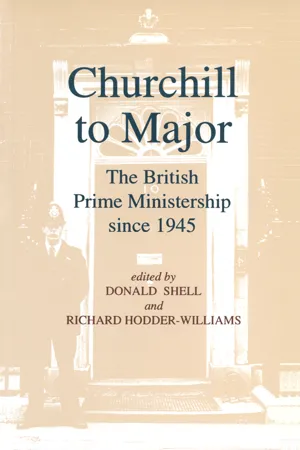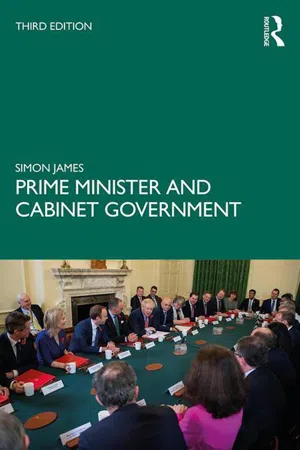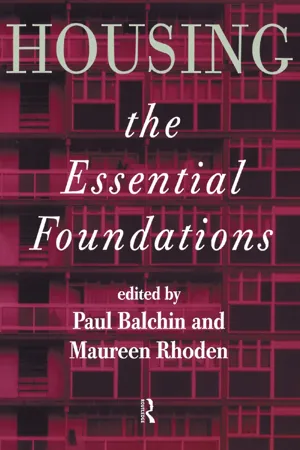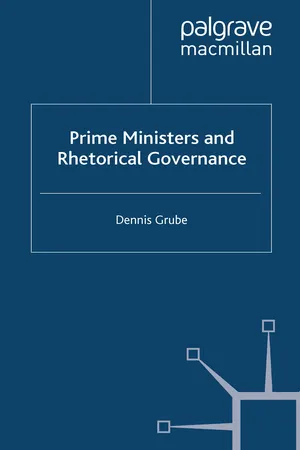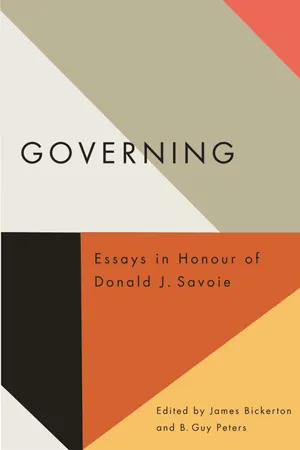Politics & International Relations
Role of Prime Minister
The role of the Prime Minister is to lead the government, make key policy decisions, represent the country internationally, and oversee the functioning of the executive branch. In parliamentary systems, the Prime Minister is typically the head of the government and is responsible for coordinating the work of various ministries and implementing the legislative agenda.
Written by Perlego with AI-assistance
Related key terms
Related key terms
1 of 4
Related key terms
1 of 3
5 Key excerpts on "Role of Prime Minister"
- eBook - ePub
Churchill to Major: The British Prime Ministership since 1945
The British Prime Ministership since 1945
- R.L. Borthwick, Martin Burch, Philip Giddings(Authors)
- 2016(Publication Date)
- Routledge(Publisher)
7THE PRIME MINISTER AND INTERNATIONAL RELATIONS J.M. LeeThe conduct of international affairs since 1945 has had a dramatic impact on the office of prime minister. The increasing influence of international forces on the form and implementation of domestic policies has given the prime minister a wider range of co-ordination problems. Prime ministers are expected to provide the leadership which will find solutions to domestic problems against constant pressures in the management of foreign policy. External forces have both reshaped the roles which prime ministers play and introduced new constraints upon their exercise of power and influence.Distinctions between foreign and domestic policy have been blurred, as have the conventions of managing them in fairly separate spheres of action. There is no longer the dividing-line that there once was between ‘home’ and ‘colonial’ or between ‘domestic’ and ‘imperial’. Instead prime ministers are for ever considering the interweaving of domestic and international affairs. Estimates of the allocation of prime ministerial time suggest that all incumbents in the office now spend more than half their working hours on matters arising from external questions. The cabinet secretary thought that James Callaghan spent at least 60 per cent of his time on international affairs; many commentators thought that towards the end of her period in office they were occupying 80 per cent of Margaret Thatcher’s time. The consequences of the intergovernmental conference which drew up the Maastricht treaty in 1992 loomed large on John Major’s daily agenda.There are three aspects of the roles of the prime minister which are strongly influenced by events overseas. First for most practical purposes, the prime minister as head of government in a constitutional monarchy is seen to be sharing with the head of state the role of embodying the nation. The phrase ‘relations with the palace’ – that domain of delicate negotiation and convention which determines what the monarch and what the prime minister shall do – has to be understood by foreign governments. Ambassadors are accredited to the Court of St James but the representatives of foreign powers expect to enjoy access to Number 10 Downing Street. If these expectations are modified in any way, there are repercussions upon the practice of negotiations as well as upon diplomacy and protocol. Secondly, as chairman of the cabinet and of its principal committees, the prime minister is responsible for co-ordinating the actions of different government departments whenever a national policy or a national stance is required. Foreign governments need to appreciate how the issues of foreign policy impinge on the relationships between departments and on domestic opinion as a whole. Any shift in a national order of priorities may have an effect upon the relationships between British and foreign governments. Thirdly, the prime minister is the only member of the government who can give a lead in policy and effectively bring together the sources of intelligence about what is happening overseas, and at the same time regulate access to the deductions and diagnoses which are presented. All governments try to intercept and decode the traffic between different parts of other governments, so that they can judge the alternative lines of action which are being considered and prepared. Any change in the conventions determining who ‘needs to know’ the secrets of state can influence what government decides. - eBook - ePub
- Simon James(Author)
- 2020(Publication Date)
- Routledge(Publisher)
Because this book is essentially concerned with the policy-making process, it will focus on the Prime Minister’s role as head of government. This can be divided into five broad categories: running the key functions of government; fostering collective responsibility; giving strategic leadership; involvement in individual policy issues; and involvement in international relations.The Prime Minister’s role as head of government
Managing the key functions of government
These consist of those basic tasks necessary to form a government and keep it running. The Prime Minister must appoint and dismiss ministers; chair the Cabinet; establish Cabinet committees and appoint their chairs; and order the distribution of functions between ministers and departments. The Prime Minister is always Minister for the Civil Service (a junior minister does the day-to-day work). He or she also has certain formal duties, including accountability to the monarch for the running of the government and responsibility for some patronage, fulfilled at an audience with the Queen every few weeks. The Prime Minister also advises the Queen on certain formal constitutional issues such as the prorogation of Parliament (which became a radioactive political issue in 2019, when the Supreme Court ruled illegal the Prime Minister’s advice to the monarch that Parliament should be prorogued for an unusually long period). These are the fundamental organisational tasks that any Prime Minister, however passively inclined, must carry out.Collective responsibility
Second, the Prime Minister must ensure the observance by ministers of collective responsibility, abiding by all government decisions and publicly defending them, whether at heart they support them or not. That means setting colleagues an example in two ways. Most obviously, by personally observing the rules and forbearing from communicating private misgivings to the public. (Wilson and Thatcher were prone to the vice of leaking, which encouraged their colleagues to do likewise; this became a pervasive, self-destructive virus under the Blair and Brown governments.) But second, the Prime Minister must also foster actively amongst ministers a sense of collegiality, that they are all in this together. That involves ensuring that they are properly consulted on all major policy developments. Ministers cannot be a party to every one of the hundreds of ministerial decisions taken every year, but as Macmillan – probably the most skillful manager of a cabinet in the past century – put it in the 1950s, the important thing is that ministers should “feel reasonably in the picture” (The National Archive PREM 11/3223). Unfortunately, most Prime Ministers fall down in this area – Theresa May, unexpectedly, seems to have been an exception – either because they are temperamentally unwilling to engage in the necessary discussions or because they find it politically convenient to keep ministers in the dark: Blair and Brown exemplify both reasons for the omission. More of this below and in Chapter 7 - eBook - ePub
- Dr Paul Balchin, Paul Balchin, Maureen Rhoden(Authors)
- 2002(Publication Date)
- Routledge(Publisher)
The function of the Prime Minister is to lead the majority party—a function requiring the loyalty of his or her party and the command of the House of Commons. However, the loyalty of the party is not absolute and revolts do occur from time to time, such as the continuing debate within the Conservative Party regarding whether or not Britain should remain a member of the European Union, and if so, what limits should be set in order to remain a member.The Prime Minster has the power to appoint and dismiss and decides who will be a member of the Cabinet (see below). In deciding on appointments to the Cabinet the Prime Minister has to ensure that senior colleagues and important factions within the party are not offended.The Prime Minister’s power of appointment stretches beyond the Cabinet and also includes positions such as hereditary and life peers, heads of Royal Commissions and Permanent Secretaries within the civil service. The Prime Minister is expected to ‘encourage, even inspire; he must coordinate, preserve balance, keep the convoy moving steadily’ (Madgwick, 1984:58–9).The Prime Minister chairs the Cabinet and regulates the agenda and its debates. He or she controls the Cabinet committees and how the information is disseminated.The Prime Minister also has a wide range of public duties at home such as formal speeches, receptions and broadcasts which can enhance the high public image which the position has. When abroad the Prime Minister is expected to represent the nation.The Prime Minister has an important role to play in the House of Commons, being expected to be the main spokesperson and to lead the party on the floor of the House. He or she must also participate in major debates, make statements and answer questions once a week in Prime Minister’s question time. The performance of the Prime Minister in Prime Minister’s question time is crucial in terms of the public image which is conveyed in terms the skills which he or she has of debate and repartee. The Prime Minister also has a duty to maintain contact with the governing party’s backbenchers (Members of Parliament who are not Ministers) through formal or informal meetings/sessions. - eBook - ePub
- D. Grube(Author)
- 2015(Publication Date)
- Palgrave Macmillan(Publisher)
In essence, the core roles played by the rhetorical prime minister mirror the different political or governing roles a prime minister plays in the polity. In other words, a central claim here is that each distinct ‘public’ duty of a prime minister has an accompanying rhetorical role which has to be carried out in order for the duty to be effectively met. To develop these categories of rhetorical action, I build on analytical studies of the prime ministership in Britain and Australia that have attempted to set out some of the duties of a prime minister. It is a task fraught with difficulty. As extensive scholarly debates on the idea of the ‘core executive’ (see Dunleavy and Rhodes, 1990; Elgie, 2011) and on the ‘presidentialisation’ of prime ministers (see for example Foley, 1993, 2000; Bevir and Rhodes, 2006) have shown, there is no one dominant understanding of what it is that prime ministers actually do.Shell (1995) identifies and distinguishes between the three core roles of ‘head of government’, ‘party leader’ and ‘national leader’. Weller and other contributing authors (1992) and the contributing authors to Shell and Hodder-Williams’ edited collection (1995) also bring out the role of the prime minister within the cabinet, in international relations, with the media, within the parliament and in dealing with the public service. Peter Hennessy’s seminal work lists a range of more specific responsibilities, including constitutional requirements and appointment powers (2000, pp. 53–101). All of these studies agree on the contextual nature of prime ministerial power and the degree of personal choice that remains for each leader in the amount of time they will attach to each activity that they undertake. Richard Heffernan’s important body of work on the topic suggests that prime ministers have a central role in ‘developing workable policies, winning elections, managing the government and working with and through other actors in both government and parliament and at home and abroad’ (Heffernan, 2005, p. 606).Here, I focus on categories of action in which prime ministers have a public rhetorical responsibility. In other words, the roles in which they are expected to provide some kind of rhetorical lead through their public appearances. This excludes from this study much of what occurs in cabinet, or in relationships with the monarch, advisers and bureaucrats, which necessarily happen behind closed doors. The focus is also on public roles outside of the parliament, rather than appearances within the parliament itself. The rhetorical prime ministership’s development as an extra-parliamentary institution has been central to its evolution. - eBook - ePub
Governing
Essays in Honour of Donald J. Savoie
- James Bickerton, B. Guy Peters(Authors)
- 2013(Publication Date)
- McGill-Queen's University Press(Publisher)
There is an ongoing debate over the sources and limits of prime ministerial power, and much of it has arisen in response to the original and provocative scholarship of Donald J. Savoie. This is not the place to discuss in detail the Savoie thesis that power has been excessively concentrated in the hands of the prime minister and a set of courtiers who surround and support him (see Bakvis 2000–1 and White 2005 for some analytical and substantive issues regarding the Savoie thesis). However, in order to discuss the growing significance of communications as a prime ministerial resource, I need to offer my own brief interpretation of the issues involved (Thomas 2003–4). A good starting point, I believe, is to recognize that any prime minister operates simultaneously in at least four overlapping and intersecting worlds: the external world of interdependence with other governments, non-governmental organizations, and outside actors from various backgrounds; the world of his own party in Parliament and across the country, as well as competition and dealings with other parties; the media world of shifting issues and pressures for instantaneous responses; and the day-to-day world of running government. These four inter-connected worlds have become more complicated and challenging, with the result that prime ministers have less control than in the past over the issues that arrive on the institutional agenda of government and how those issues are framed. Furthermore, the required response times with many issues have been shortened dramatically.Critics of the all-powerful-prime-minister thesis point to these wider contextual circumstances as evidence that it is less possible today than in previous decades for a single individual to be fully in charge of the agenda of government. Bevir and Rhodes (2006) suggest that the seeming paradox of a dispersed governance model and a centralized prime ministerial model reflect, in the United Kingdom case at least, the distorting influence of the “Westminster Model” which serves as a “smokescreen” of the changing nature of power and leadership dynamics both outside and inside government.Once issues are accepted as appropriate for government action, the prime minister can be very influential in determining the nature of policy and administrative responses. As Savoie notes, the prime minister can launch a policy initiative at any time and will decide whether or not to respect the requirements of the “normal” policy process. Other cabinet ministers can propose policy, but normally they must work through the cabinet process, which requires gaining the support of the central agencies that support the prime minister. However, the scarcity of time and attention for issues is the most fundamental constraint on prime ministerial power. On a daily basis, the life of any prime minister is hectic, fragmented, episodic, pressured, and stressful, despite all the efforts of staff to plan and organize activity. No prime minister can arrange to be at every meeting, read every important piece of communication, and participate in every significant conversation that affects what happens in government. Practising political management by exception and delegation to others is unavoidable and essential. These fundamental facts of the central governing process make communication and coordination in the inner circles crucial to the effective design and delivery of policy and its implementation, including working through and with the public service. Policy must also be explained and defended in Parliament and the media, with affected groups, and to the general public, all in the interest of building understanding and support for government action.
Index pages curate the most relevant extracts from our library of academic textbooks. They’ve been created using an in-house natural language model (NLM), each adding context and meaning to key research topics.
Explore more topic indexes
Explore more topic indexes
1 of 6
Explore more topic indexes
1 of 4
